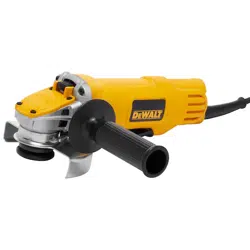Loading ...
Loading ...
Loading ...

Coarse 16 – 30 grit
Medium 36 – 80 grit
Fine Finishing 100 – 120 grit
Very Fine Finishing 150 – 180 grit
1. Allow the tool to reach full speed before touching tool to the work
surface.
2. Apply minimum pressure to work
5˚–15˚
FIG. 15
surface, allowing the tool to operate at
high speed. Sanding rate is greatest
when the tool operates at high speed.
3. Maintain a 5˚ to 15˚ angle between the
tool and work surface. The san ding
disc should contact approximately
one inch of work surface.
4. Move the tool constantly in a straight line to prevent burning and
swirling of work surface. Allowing the tool to rest on the work
surface without moving, or moving the tool in a circular motion
causes burning and swirling marks on the work surface.
5. Remove the tool from work surface before turning tool off. Allow
the tool to stop rotating before laying it down.
Mounting and Using Wire Brushes
andWire Wheels
Wire cup brushes or wire wheels screw directly on the grinder
spindle without the use of flanges. Use only wire brushes or wheels
provided with a 5/8"–11 threaded hub. A Type 27 guard is required
when using wire brushes and wheels.
CAUTION: Wear work gloves when handling wire brushes
and wheels. They can become sharp.
CAUTION: Wheel or brush must not touch guard when mounted
or while in use. Undetectable damage could occur to the accessory,
causing wires to fragment from accessory wheel or cup.
MOUNTING WIRE CUP BRUSHES AND WIRE WHEELS
1. Thread the wheel on the spindle by hand.
2. Depress spindle lock button and use a wrench on the hub of the
wire wheel or brush to tighten the wheel.
3. To remove the wheel, reverse the above procedure.
NOTICE: Failure to properly seat the wheel hub before turning the
tool on may result in damage to tool or wheel.
USING WIRE CUP BRUSHES AND WIRE WHEELS (FIG 16, 17)
Wire wheels and brushes can be used for removing rust, scale and
paint, and for smoothing irregular surfaces.
1. Allow the tool to reach full speed before
5˚–10˚
FIG. 16
touching the tool to the work surface.
2. Apply minimum pressure to work surface,
allowing the tool to operate at high
speed. Material removal rate is greatest
when the tool operates at high speed.
3. Maintain a 5˚ to 10˚ angle between the tool and work surface for
wire cup brushes.
4. Maintain contact between the edge of the wheel and the work
surface with wire wheels.
5. Continuously move the tool in a forward and
FIG. 17
back motion to avoid creating gouges in the
work surface. Allowing the tool to rest on the
work surface without moving, or moving the
tool in a circular motion causes burning and
swirling marks on the work surface.
6. Remove the tool from the work surface before turning the tool off.
Allow the tool to stop rotating before setting it down.
CAUTION: Use extra care when working over an edge, as a
sudden sharp movement of grinder may be experienced.
English
14
Loading ...
Loading ...
Loading ...
